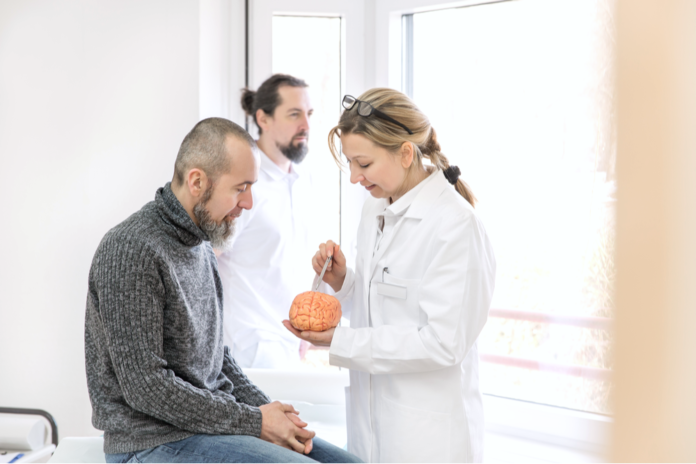Multiple sclerosis (MS) is a devastating disease that affects the brain and spinal cord. Symptoms and progression can vary making MS sometimes tricky to diagnose. According to a National MS study, almost 1 million people in the United States suffer from MS.
Stay well-informed on multiple sclerosis and the various symptoms, treatments, and preventions.
What Is Multiple Sclerosis (MS)?
Nerves stem from the brain and spinal cord and go throughout all the body to send messages and control various functions. Nerve function is needed for everything from speaking to muscle contraction. Myelin sheaths are fatty substances that surround nerve fibers and ensure nerve signals and connections get sent where they are needed in the body.
With MS, the immune system attacks the myelin sheaths surrounding nerves. When the protective myelin sheaths are damaged, the nerve signals are disrupted. It is not known the reason why the immune system starts to attack the myelin sheaths in MS.
Scar tissue can build up where the myelin sheaths are damaged which may mean scar tissue throughout several areas of the body. This is where the name multiple sclerosis gets its name: multiple areas of scarring.
The International Advisory Committee on Clinical Trials of MS has defined four basic MS disease courses, also known as phenotypes of types of MS. These included clinically isolated syndrome (CIS), relapsing-remitting MS (RRMS), secondary progressive MS (SPMS), and primary progressive MS (PPMS).
How Is MS Diagnosed?
MS does not have just one simple, single test to confirm diagnosis. Rather it is usually diagnosed when other diseases are ruled out. Symptoms can vary widely with MS depending on where the nerve damage is. This is a main reason why it can take time and be hard to diagnose.
For an MS diagnosis, a doctor must find:
- Damage in at least two areas of the central nervous system (CNS)
- Evidence this damage happened at different times
- Other diagnoses for nerve disorders are ruled out
Unfortunately, repeat testing may be needed for MS and may take time to diagnose as symptoms progress. In 2017 the International Panel on the Diagnosis of Multiple Sclerosis gave guidelines that may help speed up the process of diagnosing MS through using an MRI and analysis of cerebrospinal fluid.
MS Symptoms
Myelin sheath damage from MS can happen at different parts of the body and create a number of varying symptoms. This is what can make MS hard to diagnose.
One person with MS may have completely different symptoms than another. Common symptoms from MS can also be symptoms from other health conditions which is why doctors need to rule them out for diagnosing MS.
Common symptoms and signs of MS may include:
- Fatigue or weakness
- Numbness in one part of the body
- Feeling dizzy or light headed
- Vision problems
- Bladder or bowel problems
- Walking difficulty
- Mood changes or depression
Note this is not an extensive list; there are other less common symptoms. Someone with MS may have none, one or more than one of these more common symptoms.
MS Treatment & Prevention
Currently there is no cure for MS. Treatment options are meant to slow the progression of the disease and manage symptoms.
For best treatment, a diverse, comprehensive team of specialists is recommended. For example, in addition to primary physicians, a neurologist, occupational therapist and other professionals may help with treatment.
There are various medications for symptoms and to help slow disease progression. What medication is needed will be individualized depending on symptoms and severity.
Complementary Treatment
There are various complementary treatments for MS which may help some people with MS in addition to conventional medicine. These complementary approaches are meant to supplement conventional medicine and treatments.
Very little, if any, supporting research from most complementary treatments exists. However, complementary treatments and alternative medicine for MS may include:
- Acupuncture
- Exercise and physical therapy
- Massage
- Medical marjiuana
Before someone starts adding complementary treatment with MS, they should consult their healthcare team.
MS Prevention
There are still many unknowns of why a person may develop MS. Researchers claim MS is not directly inherited, and it is not a contagious disease. Research is ongoing for how someone develops MS and how to prevent it.
One thing that epidemiologists know is MS tends to get diagnosed in adults between 20-50 years old, and MS is three times more common in women compared to men. People living further from the equator in colder climates tend to have a higher prevalence of MS. MS can occur in any population group but is most common in Caucasians.
MS Awareness Month
March is Multiple Sclerosis Awareness Month, and there are many ways to donate, learn and participate in activities for MS. There are live webinars and podcasts as well as an MS art showcase throughout March with the Multiple Sclerosis Association of America.
There are many other ways to get involved such as participating in ongoing MS activities. These include walks, runs, and swim events or connecting with a local MS chapter in your local area.
Bottom Line
MS is an autoimmune disease that affects nerve function throughout the body. While there is currently no clear prevention or cure, research is ongoing. Diagnosis entails eliminating other diseases that may have the same symptoms as MS, and treatment options are currently based in managing symptoms and delaying disease progression.
There are many ways to learn more about MS through MS Awareness Month and support those with MS. There are ongoing events to help raise money for MS research like MS walking or biking activities.
Reference:
National Multiple Sclerosis Society. https://www.nationalmssociety.org/. Published February 5, 2021.






